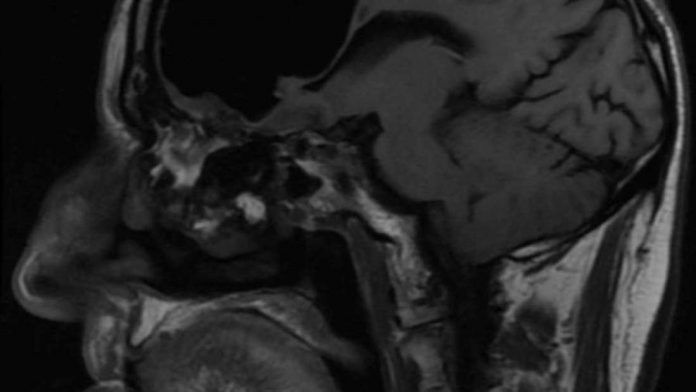Doctors find giant air pocket where part of man’s brain should be.
After suffering from some fairly mild symptoms, one unlucky guy from Northern Ireland took a trip to the hospital, only to find out he had an apple-sized air bubble in his skull.
As explained in a case report called “The man that lost (part of) his mind” in the journal BMJ Case Reports, the 84-year-old man turned up to the emergency room at Causeway Hospital in Northern Ireland after suffering from a weakness on the left side of his body and repeatedly falling over. Other than this, he appeared fine, with no signs of confusion, no visual disturbances, and relatively normal blood test results.
Perhaps nothing too strange for a man of his age, but further investigations revealed these symptoms were a red flag signaling much bigger problems. Brain-imaging CT scans revealed a strange 9-centimeter (3.5-inch) void in his skull just behind his forehead in the right frontal lobe.
“We were able to see the brain scan images before receiving the formal report from our radiology specialists and immediately knew something was not right!” Dr Finlay Brown, study co-author and physician at Causeway Hospital, told Newsweek. “I wondered if the patient had previously undergone brain surgery or had a congenital abnormality we didn’t know about.”
Although the scan appeared to show part of his brain was missing, it later transpired the doctors were looking at a massive air-filled cavity, what’s known as a pneumatocoele. His brain was still there, it had just been squished out of the way by the pocket of air.
“To find a pocket of this size in an organized fashion was extremely uncommon, with very few documented cases found while I was researching for writing up the case report,” Brown added.
These air pockets can occur for a number of reasons, namely as a result of an injury to the head, an infection, or the aftereffects of a surgical procedure. Occasionally they can arise if there’s a problem with the interconnected canals of the ears, nose, and throat.
“Sometimes it can be precipitated by a more acute event, for example, following a bout of sneezing or coughing,” the study’s authors wrote.
The man had a long stay at the hospital but completely refused any surgery. He was later discharged and put on a secondary stroke prevention program, after which his left-sided weakness appeared to have been resolved.
































